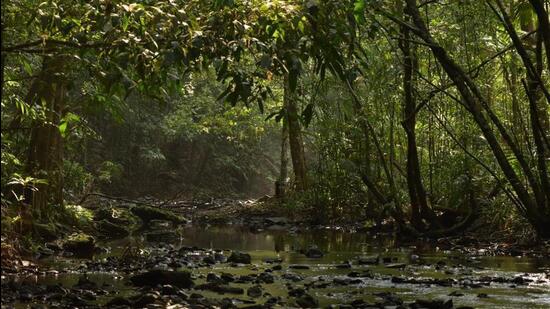Lessons from arid Kutch: Global warming a threat to evergreen forests
Tropical rainforests face threats from global warming, with a study revealing past ecological changes and urging action to reduce carbon emissions.
Tropical rainforests, considered the lungs of the Earth for their capacity to work as major carbon cleansers, are under threat.

A recent study by scientists at Birbal Sahni Institute of Palaeosciences (BSIP) has indicated the possibilities of ecological changes due to global warming.
They have studied around 40-million-year old sedimentary rock layers of the Kutch Basin to find how the warming during Middle Eocene Climate Optimum (MECO) led to disturbances in tropical/evergreen rainforests which they say once existed in the region.
Poonam Verma, a scientist involved in the research, said that the Kutch Basin resembles a book, with layers revealing information about different biota from various time periods.
“Approximately 40 million years ago, during the MECO era, the Earth underwent a warming phase where global temperatures were projected to be three to six degrees Celsius higher than they are today and carbon concentration 2.5 times higher. During this period of extreme warming, the tropical rainforest was impacted due to probable fluctuations in rainfall seasonality. We found an increase of evergreen-deciduous taxa during the peak warming period in the pre-existing tropical evergreen forest. However, due to rapid regeneration capacity, the tropical evergreen forest recovered gradually with the return of previous conditions,” said Verma.
“We also found that the mangroves present in the region were also disrupted during the warming. This indicates that if global warming continues at the existing rate, it can disrupt mangroves in other parts of the world and be a threat to the coastal ecosystems and communities. At the same time, warming can disrupt the hydrological cycle, which may change the composition of tropical rainforests, diminishing the green canopy which significantly reduces carbon from the atmosphere,” Verma added.
She said that the depletion of rainforests can also lead to an increase in temperatures further. “We have already entered the global warming period where temperatures have risen approximately one degree Celsius above the global mean temperatures. Hence, there is a need for intervention at all levels to reduce the effects of global warming. Gaining insight into past climate responses enables us to better predict and plan the mitigation strategies for the impacts of modern-day global warming,” she added.
Director BSIP, MG Thakkar, who was also part of the research, said that there have been certain episodes in the past like the Paleocene–Eocene thermal maximum (PETM) about 56 million years back and MECO about 40 million years back that can give lessons for the current warming period.
“During the PETM episode, the carbon dioxide had increased to such an extent that sea water turned highly acidic in nature. It was also the case during MECO but to a much-reduced extent. Anthropologic activities are adding carbon dioxide emissions and degrading a rich source of oxygen, like tropical rainforests. The research is an analogue and alarm for the future doom, and it is a red signal for reducing carbon emissions,” Thakkar said.






